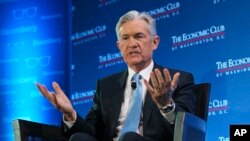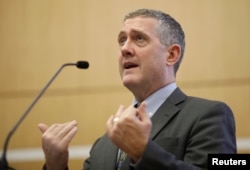Federal Reserve Chairman Jerome Powell on Thursday stressed again that the U.S. central bank can be patient in approving any further rate increases as officials gauge whether the U.S. economy will slow this year, as some in financial markets worry, or continue motoring ahead as the Fed itself expects.
Powell's second appearance in less than a week generated a subdued response in financial markets, a sign he may have found his footing in how to describe central bank policy without surprising investors. Several of his recent appearances have generated large market swings in both directions.
With no sign of excessive inflation or outsized risk in financial markets, Powell said the Fed would be "waiting and watching" in coming months.
"Especially with inflation low and under control, we have the ability to be patient and watch patiently and carefully as we ... figure out which of these two narratives is going to be the story of 2019," Powell said at the Economic Club of Washington.
WATCH: Despite Volatility in Retail Stocks, US Officials Predict Continued Growth
The S&P 500 edged up 0.45 percent on Thursday, while yields on Treasury securities were unchanged. In contrast, his remarks in his three previous appearances since late November moved stocks an average of 2.4 percent in either direction, and his comments last Friday spurred the largest market reaction yet to any of his 17 public appearances since taking office last February.
The S&P gained 3.43 percent, and the yield on the 10-year Treasury note rose 11 basis points.
In that appearance Powell emphasized the Fed's flexibility and patience in evaluating data, easing expectations of steady rate hikes in a message amplified by a half dozen other Fed officials in recent days.
Bullard is blunt
In remarks at an appearance in Little Rock, Arkansas, on Thursday, St. Louis Fed President James Bullard was blunt, saying that the central bank had reached the "end of the road" in its current rate increase cycle.
Powell and others have been less demonstrative and noted that economic data remains strong, particularly after a recent payroll report that showed more than 300,000 jobs added in December.
The central bank's vice chairman, Richard Clarida, said later on Thursday that if the global slowdown and tightening of financial markets persists, the Fed would take policy steps to offset that. It would not want to wait too long to see overseas weakness affect the U.S. economy, he added.
Powell on Thursday also reiterated that, separate from what happens with interest rates, the Fed would continue allowing its nearly $4 trillion portfolio of bonds to shrink each month, to a level "substantially smaller" than it is now.
The monthly reductions, effectively running on autopilot, have been criticized by some as a steady tightening of financial conditions the Fed should reconsider.
New narrative
Still, Powell's comments and those of other officials "are developing a new narrative ... Big picture: they don't have that much further to go and they don't have to go there fast," said Robert Tipp, chief investment strategist with PGIM Fixed Income in Newark, New Jersey.
Part of that message is meant to downplay the significance of the policy projections that officials issue every three months. The latest forecasts issued in December suggested rates could rise by a median of two more times in 2019, but Powell said it was a mistake to construe that as any sort of official forecast or "plan."
"There is no such plan," Powell said. "That was conditional on a very strong outlook for 2019," which may or may not materialize, with the Fed adjusting policy accordingly.
The U.S. central bank raised rates four times last year in the face of robust economic growth and unemployment that touched its lowest level in half a century.
Fed officials and many forecasters expect growth to slow in 2019, but to remain strong enough to continue generating jobs and keeping the unemployment rate near its almost 50-year low.
No evidence of recession
While markets may be concerned about global trade tensions and slower growth overseas, Powell said there is no evidence of a U.S. recession on the horizon. If conditions weaken, the Fed would react.
"There is no pre-set path for rates ... particularly now," he said. If global growth slows more, "I can assure you ... we can flexibly and quickly move policy, and we can do so significantly if that's appropriate," he added.
The Fed chief was also asked about the partial U.S. government shutdown. He said an "extended" shutdown would show up in economic data "pretty quickly" and, since it shutters some agencies that provide economic data, it would also make the picture of the economy less clear for the Fed.









